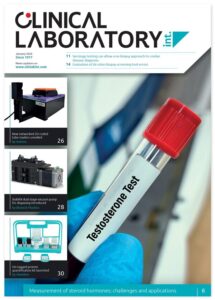Winner of first global CARES HIV/AIDS award announced at IAS 2018
The award recognizes the ‘care, dedication and commitment’ of ordinary people in the battle against HIV/AIDS.
A 28-year-old African community youth worker, Evah Namakula, has won the first, global CARES HIV/AIDS award, designed to recognize ordinary people who have shown ‘care, dedication and commitment’ in their communities as part of the fight against the disease. Ms Namakula was also part of the 2018 award launch at the International Aids Society meeting in Amsterdam (July 23 – 27).
In its first year, the CARES award focused on the dedication of ordinary people in Africa, one of the areas in the world most affected by HIV/AIDS. The award has two categories of winners – an individual, Ms Namakula, and an organization, the Hillcrest AIDS Centre Trust (HACT). This is a South African charity that cares for some of the poorest and most disadvantaged people in Africa.
Each year the winning organization will receive a grant of 5500 USD provided by Beckman Coulter Life Sciences through the Beckman Coulter Foundation. The grant is made in the name of the individual winner, but their work cannot be linked.
An independent judging panel described as ‘remarkable’ Ms Namakula’s achievements in her local Ugandan community to dispel the stigma of HIV/AIDs. She is also global youth ambassador for Reach Out Integrity (ROI) Africa, where she helps to promote health and sexual responsibility to young people. Evah has recently founded her own charity, IGNITE, to carry her work forward.
Ms Namakula is part of the Young African Leaders Initiative (YALI) set up by President Barak Obama to empower leadership skills in African youth. As a YALI volunteer, she has been working as a leadership mentor in local communities and schools, helping to develop public speaking skills.
Inspired as a child by the determination of her mother and siblings, Evah said: “l had already become a campaigner, but it was while l was working in my local hospital laboratory that I realized how I could use my medical knowledge to reduce the myth young people in my community had about HIV/AIDs.”
“Evah is an inspirational young woman and will be a hard act to follow,” said Samuel Boova, Beckman Coulter’s Director Alliance Development, High Burden HIV Markets. “She is exactly the kind of youth leader that President Obama wanted to encourage to develop the Africa of the future and we are honoured not only to have her as our first winner, but to have her support in launching the global initiative.
“The award gives a platform to the work and stories of those we see as the unsung heroes of individual communities. These are people who have shown individual dedication, commitment and courage or who have made a difference in the battle against HIV/AIDS.
“However, it is not just the final winner we want to publically recognize. We hope the award will encourage communities to learn about and honour the work of every nominee, so that more people will come forward to help and support those living with HIV/AIDS.”
Potential candidates for the CARES award can be nurses, healthcare workers, national coordinators, lab scientists and even clinicians. It could include lay people who are active in community outreach work or a social worker providing AIDS counselling.
CARES supports the UNAIDS 90-90-90 target to ensure that by the year 2020, 90% of people living with HIV will know their status, 90% of those with diagnosed HIV infection will receive sustained antiretroviral therapy, and 90% of all people receiving antiretroviral therapy will have viral suppression.
It focuses on encouraging innovative solutions for the monitoring of HIV and AIDS treatment. It was inspired by the work of Professor Debbie Glencross, a leading South African laboratory pathologist, who found an inexpensive way to measure a patient’s CD4 count, a special type of white blood cell that can indicate how compromised a person’s immune system might be. Prof Glencross is Director and Principle Pathologist in the Flow Cytometry unit of the Department of Hematology at the Charlotte Maxeke Johannesburg Academic Hospital.
Monitoring a patient’s immune system by counting the CD4 cells has to be carried out by laser technology in a special blood analyser, the flow cytometer. However, in many parts of rural Africa, the equipment and infrastructure simply hasn’t been available to test patients, get their blood samples to a laboratory, and then report the results. As Prof Glencross explained: “We are working to empower smaller community laboratories so that they can extend the availability of the test to meet demand while still meeting the requirements of the National Health Laboratory Service. This will enable best clinical and laboratory practice while reducing the time it takes to deliver the result.”
When counting CD4 cells, large global hospital labs first differentiate between the types of white blood cells, count them and then work out the number of CD4 cells in each millionth of a liter of blood. While accurate, this method can be laborious. In contrast, rather than going through the time-consuming and costly process of isolating individual antibodies, Glencross’s ingenious approach uses a mathematical equation. She realized that using the white cell count as a stable reference point would eliminate the need for additional quality control steps, while still maintaining standards.



